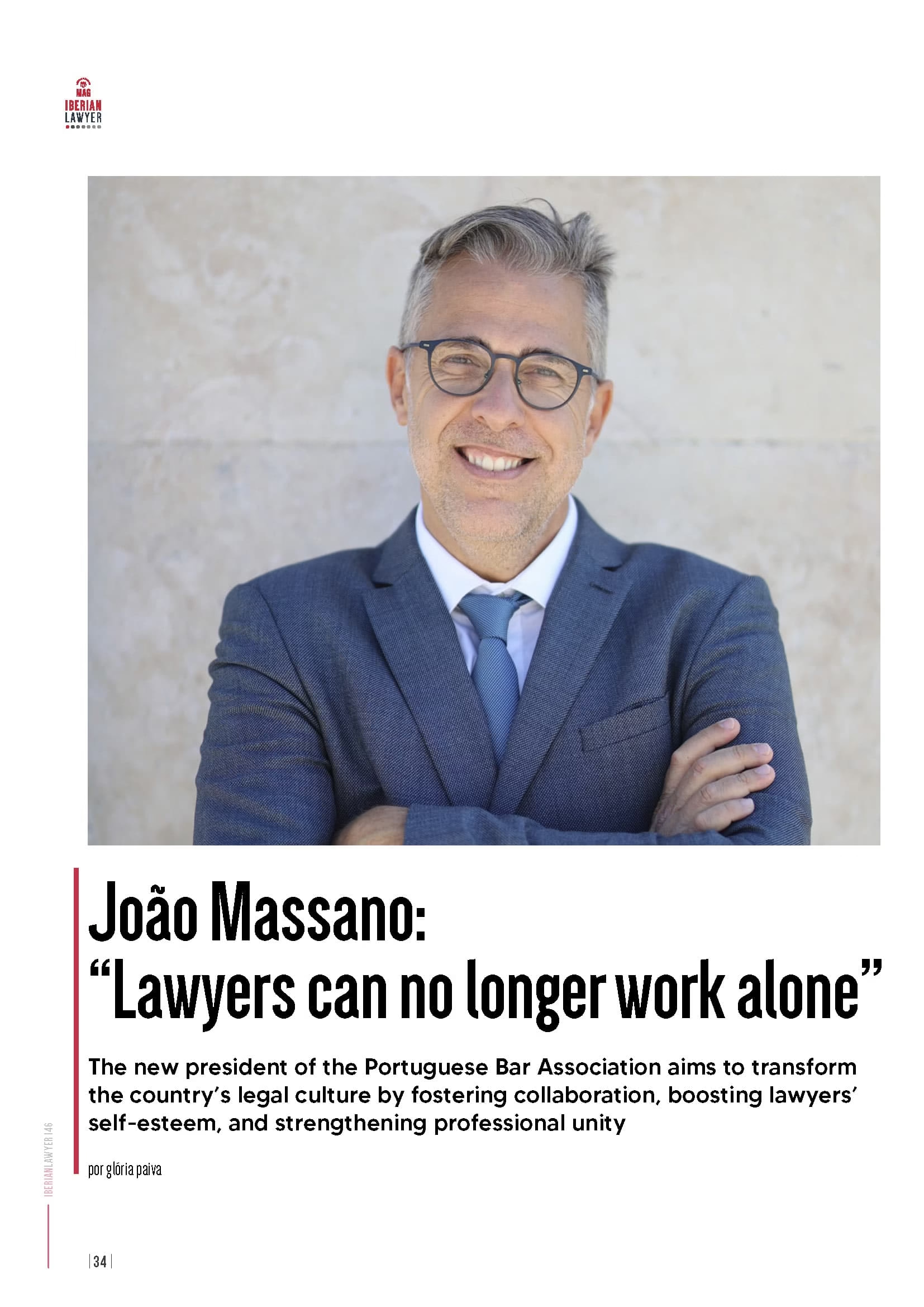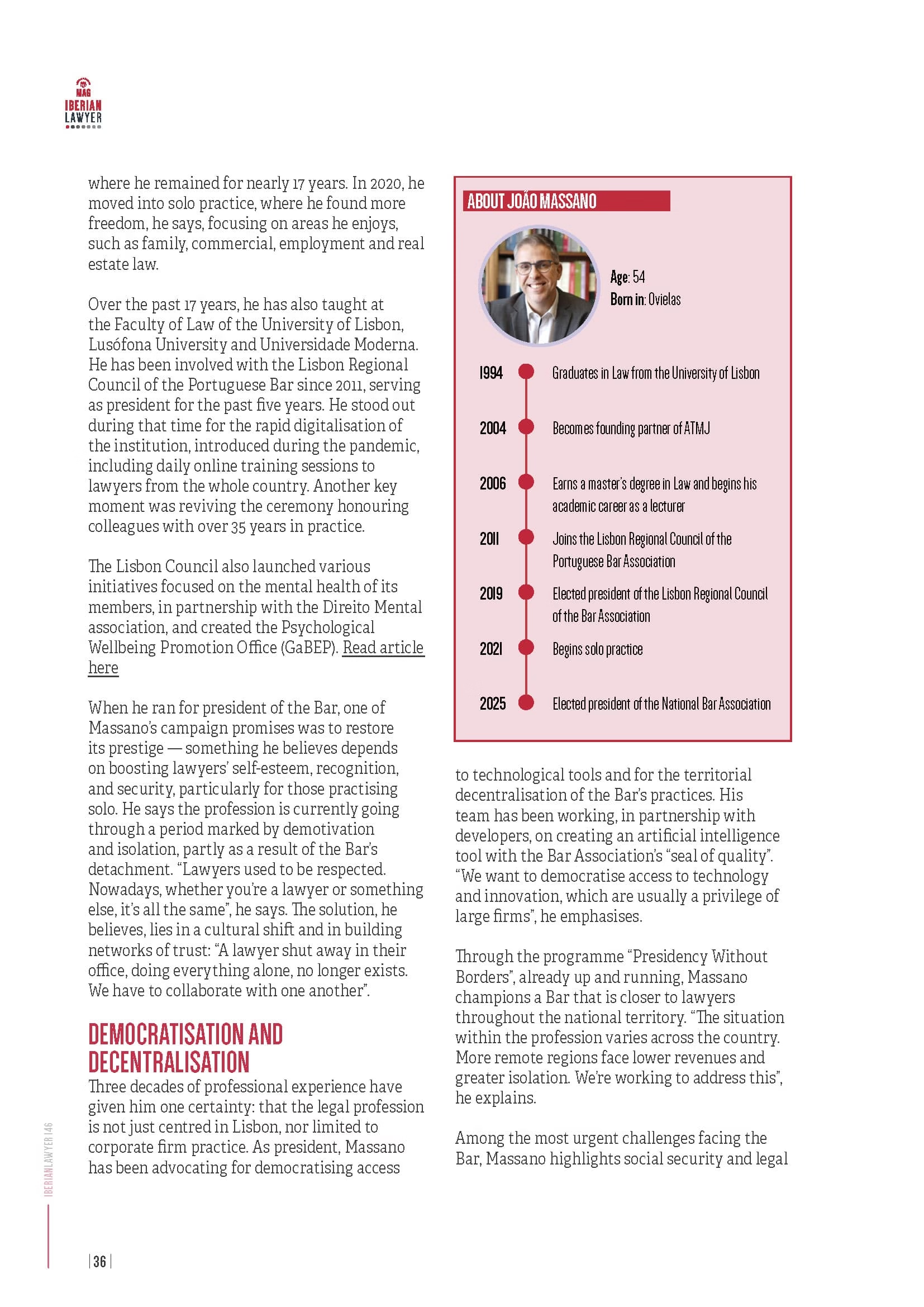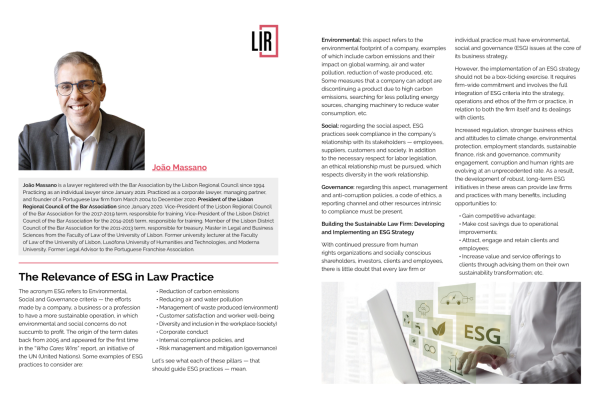João Massano:
“Lawyers can no longer work alone”
The new president of the Portuguese Bar Association aims to transform the country’s legal culture by fostering collaboration, boosting lawyers’ self-esteem, and strengthening professional unity
Por Glória Paiva
The Portuguese Bar Association (Ordem dos Advogados, OA) will celebrate its centenary in 2026. While legal education in Portugal dates back to the founding of the University of Coimbra in 1290, the Bar itself remains a relatively young institution — one that is increasingly shaped by the winds of the 21st century. As it marks 100 years, the Bar faces significant challenges, including rapid technological innovation, social insecurity, geopolitical instability, globalisation, the arrival of new players and regulations in the Portuguese market, and the declining trust in institutions such as the justice system.
 Leading it is a new president who defines himself as an idealist: he (still) sees the legal profession as a calling and believes that the lawyer is the last line of defence for the citizen against the injustices of the State. “I still believe we can transform our own little corner”, says João Massano, elected president in March, in an interview with Iberian Lawyer. Since his campaign, he set out to “unite the profession, modernise the practice and restore the Bar’s prestige”.
Leading it is a new president who defines himself as an idealist: he (still) sees the legal profession as a calling and believes that the lawyer is the last line of defence for the citizen against the injustices of the State. “I still believe we can transform our own little corner”, says João Massano, elected president in March, in an interview with Iberian Lawyer. Since his campaign, he set out to “unite the profession, modernise the practice and restore the Bar’s prestige”.
WHO IS JOÃO MASSANO
Massano began his career in the 1990s and, in 2004, became founding partner of ATMJ, the firm where he remained for nearly 17 years. In 2020, he moved into solo practice, where he found more freedom, he says, focusing on areas he enjoys, such as family, commercial, employment and real estate law.
Over the past 17 years, he has also taught at the Faculty of Law of the University of Lisbon, Lusófona University and Universidade Moderna. He has been involved with the Lisbon Regional Council of the Portuguese Bar since 2011, serving as president for the past five years. He stood out during that time for the rapid digitalisation of the institution, introduced during the pandemic, including daily online training sessions to lawyers from the whole country. Another key moment was reviving the ceremony honouring colleagues with over 35 years in practice.
The Lisbon Council also launched various initiatives focused on the mental health of its members, in partnership with the Direito Mental association, and created the Psychological Wellbeing Promotion Office (GaBEP). Read article here
When he ran for president of the Bar, one of Massano’s campaign promises was to restore its prestige — something he believes depends on boosting lawyers’ self-esteem, recognition, and security, particularly for those practising solo. He says the profession is currently going through a period marked by demotivation and isolation, partly as a result of the Bar’s detachment. “Lawyers used to be respected. Nowadays, whether you’re a lawyer or something else, it’s all the same”, he says. The solution, he believes, lies in a cultural shift and in building networks of trust: “A lawyer shut away in their office, doing everything alone, no longer exists. We have to collaborate with one another”.
DEMOCRATISATION AND DECENTRALISATION
Three decades of professional experience have given him one certainty: that the legal profession is not just centred in Lisbon, nor limited to corporate firm practice. As president, Massano has been advocating for democratising access to technological tools and for the territorial decentralisation of the Bar’s practices. His team has been working, in partnership with developers, on creating an artificial intelligence tool with the Bar Association’s “seal of quality”. “We want to democratise access to technology and innovation, which are usually a privilege of large firms”, he emphasises.
Through the programme “Presidency Without Borders”, already up and running, Massano champions a Bar that is closer to lawyers throughout the national territory. “The situation within the profession varies across the country. More remote regions face lower revenues and greater isolation. We’re working to address this”, he explains.
Among the most urgent challenges facing the Bar, Massano highlights social security and legal aid. On the topic of social security, he supports a fairer hybrid model that better protects the profession. “We need to decide whether the Lawyers’ and Solicitors’ Pension Fund (CPAS) should be integrated into the national Social Security system or remain an autonomous system”, he reflects. On legal aid, he calls for a proper update of the payment tables and better working conditions. “Although these are not direct responsibilities of the Bar president, in both areas we can exert influence through open dialogue with the Government”.
As for the state of the Portuguese justice system, Massano proposes a more practical approach. For him, justice goes far beyond the high-profile cases that shape public opinion. “There is an urgent need to reform the areas of justice that directly affect people’s lives — families, children. Tackling domestic violence, post-divorce disputes, non-compliance. These are social problems that demand immediate intervention from the justice system”, he argues.
For Massano, the lack of credibility and poor communication from institutions are structural problems, caused by a shortage of resources and the absence of unity between the different players — lawyers, prosecutors, judges and court officials. “We need to put an end to the ‘little fiefdoms’ within the justice system. In court, we must all share the same goal: to deliver justice and defend people’s rights”.
MULTIDISCIPLINARITY: THE RISKS OF POOR REGULATION
Massano also criticises the excessive use of pre-trial detention and the trend, observed in many countries such as Italy, to reduce citizens’ rights and safeguards through the abuse of criminal procedures. “Safeguards exist to protect people. What fails is the procedural path, the functioning of the system,” he notes.
The new leadership of the Bar is also working on the issue of multidisciplinarity, a practice permitted since the last revision of the statute in 2024. Massano views this matter with concern, given the new competitive landscape it brings, and warns of the risks posed by the lack of regulation for multidisciplinary firms. “The Bar must have the authority to oversee lawyers working in these firms and to ensure how legal practice is safeguarded”, he states. He considers the creation of a specific regulation for these structures to be urgent.
The new president also highlights legal literacy as one of the Bar’s key missions in its centenary year. For him, lawyers have a duty to educate the public in this regard. “A democratic society needs to be aware, in order to defend its rights. That’s one of our responsibilities as the Bar”.
To young professionals, he leaves two pieces of advice: “The legal profession must be a calling.” And he concludes: “If you want to be good lawyers, don’t give up, don’t be afraid to speak your mind, and always stay independent”.
Leia a revista em: https://www.linkedin.com/posts/iberian-lawyer_iberianlawyer-magazine-ugcPost-7347925880050016256-B6L4?utm_source=social_share_send&utm_medium=android_app&rcm=ACoAAAF5PT4ByIQ_RdsTgNmNCGObz1ufdpEz6vY&utm_campaign=whatsapp




